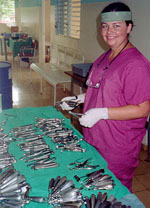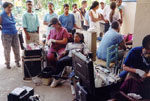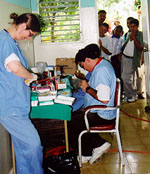Experience shapes dental attitudes
by Cindy AbolePublic Relations
Imagine the impact made within a underserved community when their health and well-being are made a priority, if only for a day, and throughout a continuous period of time.
 Dental
Medicine senior Martha Hardaway sorts through and organizes sterilized
dental instruments that will be used in the next day's clinic.
Dental
Medicine senior Martha Hardaway sorts through and organizes sterilized
dental instruments that will be used in the next day's clinic.
While the initial response of such an experience might be positive and gratifying for both patient and provider, its results may establish better habits and new attitudes that can last a lifetime.
Participating in this effort since 1985, dental medicine associate professor Linda Kaste, DDS, Ph.D., director of the Division of Dental Public Health and Oral Epidemiology, has seen improvements in the status of dental health for a part of one developing nation. The project in the Dominican Republic also provides a valuable clinical experience for dental students and practitioners.
For two decades, the Dominican Dental Program has provided dental services to the people of the Dominican Republic under the leadership of Francis G. Serio, DMD, professor and chairman of the Department of Periodontics at the University of Mississippi School of Dentistry. This year, fourth-year dental medicine student Martha Hardaway, joined Kaste on a two-week experience to the remote areas of this Caribbean island nation. From June 1-15, they participated in the operation of dental clinics near the center of the country in the town of San Jose de Ocoa and seven surrounding communities.
The mission was particularly memorable for Hardaway, who had never been to a developing nation, previously.
“I was surprised by the environment and culture but impressed by the amount of work we could get done as a team under such challenging conditions,” said Hardaway, commenting about the ruralness and tropical environment. “This is an experience that will influence me for the rest of my life.”
Two weeks and seven clinics later, the efforts of the 20-member team resulted in 350 tooth restorations, some 70 prostheses (esthetic partial dentures) and more than 2,000 tooth extractions on 1,000 Dominican patients. The program, which operates under the auspices of the Catholic Medical Missions Board with Dominican collaboration, was nationally recognized in 1991 by President George Bush with the President's Volunteer Action Award, praising their outreach efforts.
 Patients
line up to receive restoration treatment from Hardaway, center, and other
dental specialists during the June volunteer experience. The team successfully
provided dental care to about 1,000 Dominicans.
Patients
line up to receive restoration treatment from Hardaway, center, and other
dental specialists during the June volunteer experience. The team successfully
provided dental care to about 1,000 Dominicans.
A large part of the mission's annual success is credited to the cooperative efforts of Dominican and American organizers, supportive communications and sheer dedication. Besides providing people with good dental care, the team also helped to complete the daily task of loading, unloading and hauling the U.S.-sponsored equipment consisting of dental supplies, materials, and other heavy equipment.
The team, consisting of a mix of Universities of Mississippi dental students, University of Tennessee periodontics residents and dental practitioners from Pennsylvania, Mississippi and the Dominican Republic, as well as other program guests, began their days at sunrise.
Following a long drive up and down rugged, narrow dirt roads to their destinations, they worked until early evening. Clinics were arranged at remote communities and set-up within school houses or other structures large enough to accommodate a triage area and separate service locations for extractions, restorations, oral surgery and prosthetics.
 Faculty
advisor Dr. Linda Kaste, left, and Dominican dentists prepare partial dentures
for their patients.
Faculty
advisor Dr. Linda Kaste, left, and Dominican dentists prepare partial dentures
for their patients.
Organizers utilized local translators to assist in clinic activities, distribute patient forms and materials and communicate follow-up care.
For Hardaway, whose interest is in pediatric dentistry, the field experience was invaluable. Each day, she saw first-hand results of severe dental caries (tooth decay) in children and other examples of oral disease indigenous to the tropical environment. Hardaway used her knowledge and practice skills to provide preventive dental sealants, restorations and extractions.
“In no way did I think the care we provided to patients was ever compromised by the conditions or equipment used throughout this program,” Hardaway said. “Each of us made the best attempt possible to provide the same level of quality care as we do for our patients in the U.S.”
For Kaste, the annual opportunity to participate as a dental faculty member especially in a respected, well-organized program has had its benefits.
“It's easy for one to become presumptuous about things after being involved in a project for so long,” said Kaste, who has hosted five MUSC students since 1996. “But when I see the final outcomes of each day and recognize the hard work exhibited by these students, both individually and as a team, I feel proud in what they've accomplished and learned through their experiences.”
Kaste hopes the Dominican Dental Mission project instills a much-needed awareness among practitioners and students as they consider the dental disparities and oral health issues experienced abroad compared to the oral health needs of underserved populations back home.
“What participants ultimately realize is that their short-term experience offers a closer, more realistic look at how a majority of the world's population lives today,” Kaste said. “It is my hope that they are more inspired to participate in their own community-based dental programs and other outreach activities.”
Like previous dental students before her, the experience left a transforming effect on Hardaway. While there were language and cultural gaps, she felt a deep affinity to the Dominican people through their polite hospitality and sincere gratitude.
“It was amazing to discover that their attitudes and desires for good
oral hygiene and dental health were real and exceptional,” Hardaway said.
“It's these positive attitudes towards dental care that reinforces the
long-term efforts of mission work like this.”